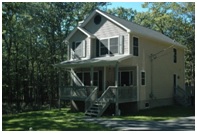Top 5 mistakes Canadians make in U.S real estate investment
Allan Madan, CPA, CA
Are you a Canadian real estate investor, looking to buy property in the US? As the US housing market at an all-time low, many Canadians are getting caught up in the hype of buying. This has given many a sense of urgency, causing them purchase without the adequate planning required. Eventually, the lack of satisfactory preparation catches up to them in the form of interest and penalties from the IRS. For a more in-depth look, please visit our resource Tax Guide for Canadians Buying US Real Estate.
In this article, I will discuss five common mistakes that Canadian investors make when investing. If you are thinking of buying, it is my hope that you will take this information to make the right decisions. For more information on being an American landlord, please visit MoneySense: Be an American landlord.
Canadian Real Estate Investment in America –
1. Not being aware of withholding tax obligations

If you are a Canadian investor and you are purchasing to rent under your own name, there is a 30% withholding tax charged to you. The IRS requires either the tenant or property manager to withhold 30% of gross rent each month to submit to them. Once you file your US return at the end of the year, the IRS will refund any excess withholding tax.
To waive this, you need to complete a W8-ECI form. Provide it to the tenant or manager responsible. When you file your return, you must file an election to treat the rental income as effectively connected income. You file the election once per property, and it will allow you to avoid the associated withholding tax. If you’re looking for a city to invest in, why not check out MSN’s article 10 best cities to buy rental property.
2. Investing through a US Limited Liability Corporation (LLC)
Let’s say you retain the service a local US lawyer for advice on your investment. Your lawyer may recommend ownership through a Limited Liability Company (LLC), the benefits of which are twofold. The first one deals with liability, as the Government regards the LLC as a separate entity from you. This protects your personal assets should any litigation arise. The second benefit is the IRS treats the LLC as if it does not exist, at least for tax purposes. Therefore, you report rental income and expenses on your personal return. If you buy through a corporation or a partnership, your annual compliance cost will be higher. If you’re selling US real estate, please visit our resource Tax Implications for Canadians selling US property.
However, the CRA considers an LLC to be a corporation created for tax purposes. This creates a double taxation issue. This is why I do not usually advise Canadian residents to own through an LLC.
3. Not being aware of property tax returns
There are some states that require to you to file an annual property return with your income tax return. Here, the government calculates additional taxes based on the total cost of assets used in rental activities. This includes furniture, appliances, and any other asset used in renting out the property. The most notable state that does this is Florida.
4. Expensing capital expenditures
Usually, purchasing buildings or land in America means travelling by airplane or car. This could be to examine a potential opportunities, or pay an accountant (or lawyer) to learn about US regulations. Though most try to claim these as rental expenses, these costs are likely capital in nature. Therefore, you must add them to the cost of the property.
But why is this? Although you might have a different definition, here’s what “property cost” means to the IRS. It represents the actual purchase price, and various costs incurred in buying the property. Because you would purchase a plane ticket and paying a fee for the purpose of buying the property, these would be added to the purchase cost.
It is also common for people to buy a property in bad condition and fix it up before renting it out. According to the IRS, all costs of this nature must be added to the cost of the property. Therefore, these costs would not qualify as rental expenses but become part of the property’s cost.
5. Believing that the rental income/expense does not need to be reported in Canada

As a Canadian investor, you are required to report your worldwide income. Therefore, US rental income must be reported on both Canada’s and America’s income tax returns. There is a treaty that prevents double taxation by way of a foreign credit.
For more information on buying buildings or land in the US, please read this great Financial Post article: What Canadians need to know about buying U.S. real estate.
Disclaimer
The information provided on this page is intended to provide general information. The information does not take into account your personal situation and is not intended to be used without consultation from accounting and financial professionals. Allan Madan and Madan Chartered Accountant will not be held liable for any problems that arise from the usage of the information provided on this page.



